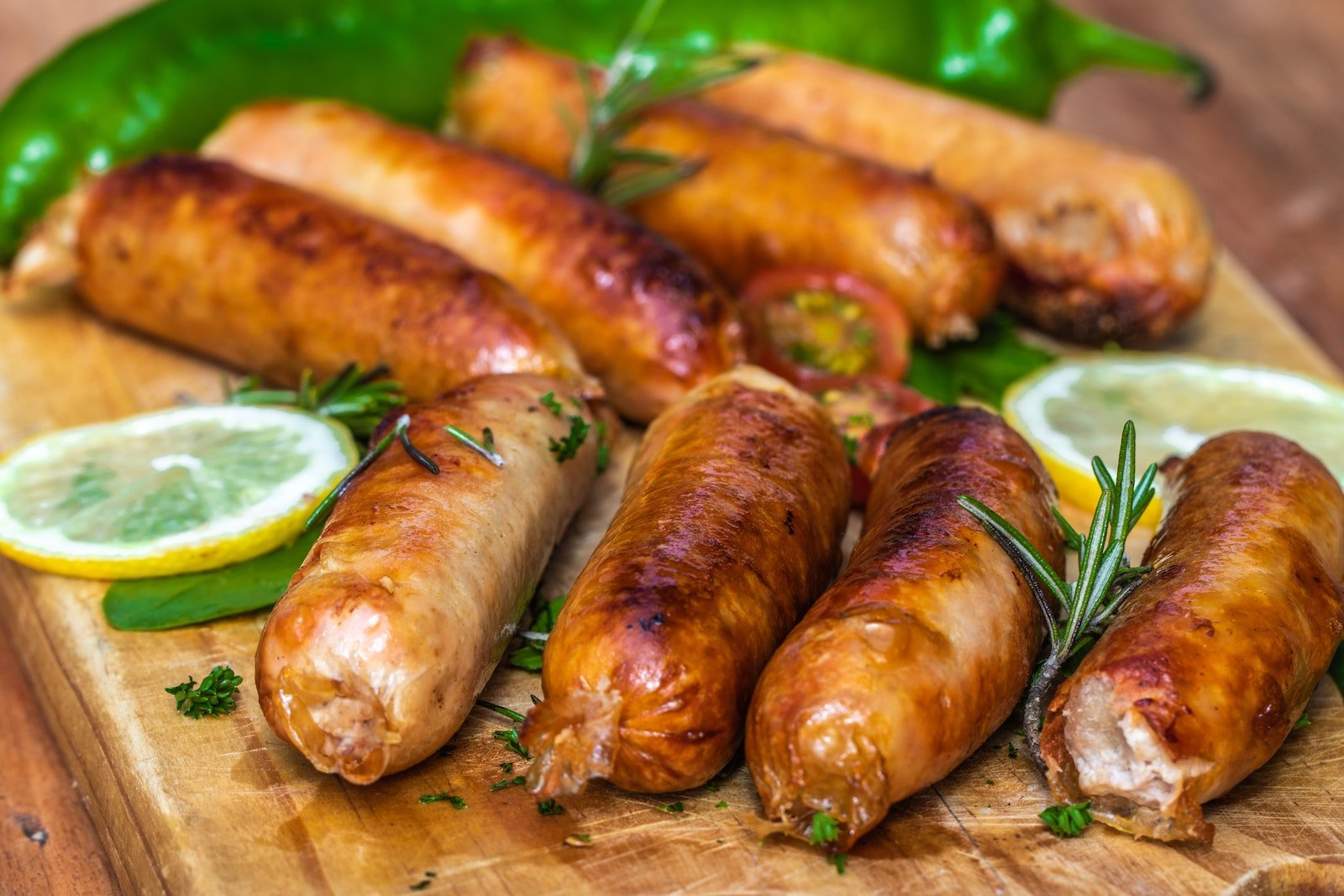As my wife and I were exploring Istanbul on our vacation, we stumbled upon a small Lebanese restaurant that caught our attention. We decided to stop in for lunch and the menu immediately intrigued us. One item, in particular, caught our eye: Lebanese sausage.
We had never tried this sausage before, but we were more than happy to give it a try. The waiter explained that it was made with a blend of beef and lamb, mixed with a variety of spices and herbs. They grilled the sausages to perfection and a middle-aged Lebanese waiter served them to us with a side of hummus and pita bread.
Upon taking our first bite, the flavors blew us away. The sausage was juicy and bursting with spices, while the hummus and pita bread complemented it perfectly. We couldn’t get enough and ended up ordering another plate to share. From that moment on, we were hooked on Lebanese sausage and couldn’t wait to try it again.
The dish consisted of sausages that contained a blend of ground beef and lamb, mixed with a variety of spices such as cumin, coriander, and allspice. The sausages were served with a side of hummus, pickled vegetables, fresh tomatoes, and pita bread.
The combination of flavors was incredible. The sausages were juicy and packed with flavor, while the pickled vegetables added a tangy and refreshing element to the dish. The fresh tomatoes and pita bread were the perfect accompaniment to the sausages, allowing us to create our own mini sandwiches.
This sausage is a popular street food in Lebanon and is often enjoyed as a quick meal or snack. It is also a common dish served at family gatherings and celebrations.
Overall, I highly recommend trying them if you have the opportunity. Their unique blend of spices and flavors is sure to leave your taste buds satisfied.
Just outside the restaurant, a street performer attracted a large crowd. The performer was a young man with a guitar, and he was playing a catchy tune that had everyone tapping their feet and nodding their heads. After the commotion settled, I couldn’t help but ask the restaurant chef for the recipe for this delicious sausage we had just devoured. To my surprise, the chef agreed to give it to me.
I eagerly jotted down the recipe, which included ingredients such as chitterlings, ground beef, fatty ground lamb, pine nuts, and a variety of spices like coriander, nutmeg, and cumin. The recipe also called for white vinegar and lemon juice to add a tangy flavor to the sausage.
I was thrilled to have the recipe in my hands and couldn’t wait to try making the sausage at home. With the detailed instructions from the chef, I was confident that I could recreate the same delicious flavors in my own kitchen.
When it comes to Lebanese sausage, there are plenty of dishes that can complement its rich flavor. Here are a few of my favorite dishes to serve alongside this delicious sausage:
- Hummus: This classic dish is a perfect match for sausages. The creamy texture of the hummus pairs well with the spicy sausage, and the flavors complement each other perfectly.
- Tabbouleh: This refreshing salad is a great way to balance out the richness of the sausage. The combination of parsley, mint, and lemon juice makes for a light and flavorful dish that pairs well with the sausage.
- Baba Ganoush: Another classic Lebanese dish, baba ganoush is a flavorful dip that contains roasted eggplant, tahini, and garlic. The smoky flavor of the eggplant is a great complement to the spicy sausage.
- Fattoush: This salad is a great way to add some crunch to your meal. It contains crispy pita chips, fresh vegetables, and a tangy dressing, fattoush is a great way to balance out the richness of the sausage.
- Labneh: This creamy dip that contains strained yogurt is a great way to cool down your taste buds after enjoying some spicy sausage. The tangy flavor of the labneh is a great complement to the rich flavor of the sausage.
Overall, there are plenty of dishes that can complement the rich flavor of Lebanese sausage. Whether you prefer something light and refreshing like tabbouleh or something rich and creamy like hummus, there’s a dish out there that’s perfect for you.
Ingredients:
- Around 1.5 meters of lamb small intestines, also known as chitterlings.
- 400g of ground beef
- 100g of fatty ground lamb
- 1/4 cup of pine nuts
- 3 cloves of garlic, finely minced
- 1/4 tsp ground coriander
- 1/4 tsp ground nutmeg
- 1/4 tsp ground cumin
- 1/4 tsp black pepper
- 1/4 tsp cayenne pepper powder
- 1/8 tsp ground cloves
- 1/4 tsp ground fenugreek
- 3/4 tsp of salt
- 1/2 tablespoon white vinegar
- 1/2 tablespoon lemon juice
- 1/2 cup of water
How To Make Lebanese Sausage?
- To start making it, first, prepare the chitterlings by washing and cleaning them thoroughly with cold water. Once they’re clean, set them aside.
- Next, Combine beef, lamb, pine nuts, and spices in a food processor. Process until the meat is finely ground and the spices and pine nuts are thoroughly blended. Then, transfer the meat mixture into a large bowl and add vinegar, lemon juice, and water. Knead the mixture for 2-3 minutes.
- After that, tie one end of the chitterlings with cotton thread and fill them with the stuffing mixture. Shape them into sausages and twist them about every 10cm. Refrigerate them for 1-2 hours to become cold.
- Once the sausages are cold, cut them into twists and cook them. You can either grill or fry them, and serve them hot. It’s that simple!
Variations of Lebanese Sausage
As I explored the world of Lebanese cuisine, I discovered that there are various types of Lebanese sausage. Each type has its unique flavor, texture, and preparation method. Here are some of the most popular variations that I have come across:
Makanek
Makanek is a small, thin sausage that contains ground lamb or beef mixed with spices, herbs, and pine nuts. Locals usually serve them as an appetizer or a side dish and often accompany them with lemon wedges and pita bread. Makanek has a slightly sweet and tangy flavor that is enhanced by pine nuts.
Soujouk
Soujouk is a spicy sausage that contains ground beef or lamb mixed with garlic, cumin, paprika, and other spices. You can have it as a breakfast dish or a sandwich filling. Soujouk has a bold, smoky flavor and a chewy texture that makes it a popular choice among meat lovers.
Basterma
Basterma is a cured beef sausage that is marinated in a mixture of garlic, fenugreek, and other spices. You can eat it as a cold cut or a sandwich filling. Basterma has a salty, tangy flavor and a chewy texture that pairs well with fresh vegetables and creamy spreads.
Sujuk
Sujuk is a dry, spicy sausage that contains ground beef or lamb mixed with chili flakes, garlic, and other spices. Thinly slice it and serve it as a snack or a topping for pizzas and sandwiches. Sujuk has a bold, fiery flavor that is not for the faint of heart.
Loubieh Bi Zeit
Loubieh Bi Zeit is a vegetarian sausage that contains green beans, onions, tomatoes, and olive oil. You can usually serve it as a side dish or a salad and is a popular choice among vegetarians and health enthusiasts. Loubieh Bi Zeit has a fresh, tangy flavor and a crunchy texture that makes it a refreshing addition to any meal.
In conclusion, Lebanese sausage is a versatile and delicious food that comes in various shapes and sizes. Whether you prefer spicy, salty, or sweet sausages, there is a Lebanese sausage out there for you. So why not give them a try and experience the flavors of Lebanon for yourself?
Serving Suggestions for Lebanese Sausage
When it comes to serving Lebanese sausage, there are many delicious and creative ways to enjoy this savory treat. Here are a few suggestions:
- Grilled Sausage: One of the most popular ways to prepare sausages is to grill them. Simply heat up the grill to medium-high heat, and cook the sausage for 10-12 minutes, turning occasionally. Serve with grilled vegetables, pita bread, and a side of hummus for a delicious and satisfying meal.
- Lebanese Sausage and Eggs: For a hearty breakfast or brunch, try serving this sausage with eggs. Fry up the sausage in a pan, and then add in some beaten eggs. Cook until the eggs are set, and then serve with toast or pita bread.
- Lebanese Sausage and Rice: Another great way to enjoy it is to add it to a rice dish. Cook up some rice, and then mix in chopped sausage, chopped vegetables, and some spices. Serve hot, and enjoy!
- Lebanese Sausage Sandwich: For a quick and easy meal, try making a Lebanese sausage sandwich. Toast some bread, and then add in sliced sausage, lettuce, tomato, and your favorite condiments.
- Lebanese Sausage and Salad: If you’re looking for a lighter meal, try serving it with a fresh salad. Mix up some greens, chopped vegetables, and a simple vinaigrette dressing. Top with sausage slices for a protein-packed meal.
No matter how you choose to serve Lebanese sausage, one thing is for sure – it’s a delicious and versatile ingredient that you can enjoy in many different ways.
Storing and Preservation of Lebanese Sausage
When it comes to storing and preserving Lebanese sausage, there are a few things to keep in mind to ensure its freshness and quality. As someone who has grown up eating this delicious sausage, I can tell you that it’s worth taking the time to store it properly.
Firstly, it’s important to note that sausages are cured meat, which means they have a longer shelf life than fresh meat. However, you still need to store them correctly to prevent spoilage. Here are some tips on how to store and preserve them:
- Refrigerate or Freeze: Refrigerate or freeze the sausages as soon as possible after purchase. If you plan on consuming them within a few days, store them in the refrigerator. If you want to keep them for longer, freeze them. These sausages can last up to six months in the freezer.
- Wrap it up: When storing them, wrap them tightly in plastic wrap or aluminum foil. This will help prevent air from getting to the sausages, which can cause them to dry out and become tough.
- Avoid moisture: These sausages should be kept as dry as possible. Moisture can cause the sausages to spoil quickly. Make sure to remove any excess moisture before storing them.
- Store it in the right place: Store them in the coldest part of the refrigerator or freezer. This is usually the back of the fridge or the bottom of the freezer. Avoid storing them in the door of the fridge, as this area is subject to temperature fluctuations.
- Thaw it correctly: If you’re taking these sausages out of the freezer, make sure to thaw them correctly. To ensure safety, it is recommended to move them from the freezer to the refrigerator and allow them to thaw gradually overnight. Avoid thawing them at room temperature, as this can cause bacteria to grow.
By following these tips, you can ensure that your sausages stay fresh and delicious for as long as possible. So go ahead and stock up on this delicious cured meat – you won’t regret it!
Conclusion
Lebanese sausage is a delicious and unique food that is worth trying. Through my research and personal experience, I have found that the combination of spices and meats used in these sausages creates a flavor that is both savory and slightly sweet.
One of the standout features of Lebanese sausage is the use of cinnamon, which adds a subtle sweetness to the meat. The blend of cinnamon, allspice, and other spices creates a complex and satisfying flavor profile that is sure to please any palate.
Another aspect of it that sets it apart is the use of lamb as the primary meat. This gives the sausage a rich and hearty flavor that is perfect for grilling or cooking in a variety of dishes.
Overall, I highly recommend giving Lebanese sausage a try. Whether you are a fan of sausage in general or just looking to try something new, this unique and flavorful food is sure to impress.




